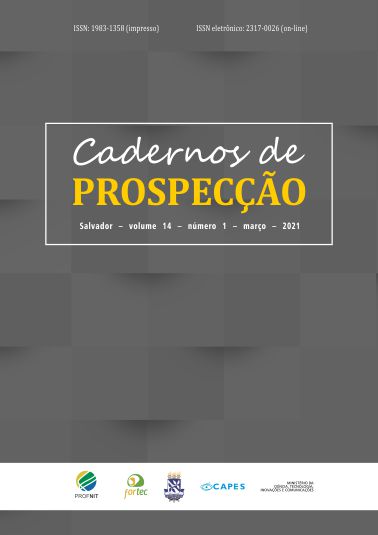Prospective Studies and Genetic Improvement of the Coconut Tree: historical survey of market forces, socio-political, economic, technological aspects and stakeholders involved in the coconut production chain
DOI:
https://doi.org/10.9771/cp.v14i1.33806Keywords:
Coconut Genetical Enhancement, Coconut, Technological Prospection.Abstract
By understanding that modern times requires Science which dialogues with the responsible ones that, along with it, form the innovation network, prospective studies play an essential role with PD&I organizations in the strategic decision-making process. Considering that such studies aim to understand the various market forces, this paper’s goal is to present a historical survey about the prospective studies related to the coconut tree culture. Based on the records of four prospective studies carried out by Empresa Brasileira de Pesquisa Agropecuária (EMBRAPA) Tabuleiros Costeiros teams at different historical moments (1987, 1996, 2014 and 2017/2018), a historical contextualization of the demands raised by such studies is presented, especially regarding the area of genetic improvement. Thereby, it is expected to record an important history in the Brazilian agricultural research and contribute to reflections on the importance of a dialogue between Science and Value Chains, seeking to contribute to actions that effectively meet social demands.
Downloads
References
ALEXANDRE, A. F. A dinâmica da sociedade de risco segundo Antony Giddens e Ulrich Beck. Geosul, Florianópolis, v. 15, n. 30, p. 150-167, jul.-dez. 2000. Disponível em: https://periodicos.ufsc.br/index.php/geosul/article/viewFile/14312/13154. Acesso em: 10 set. 2020.
ARAGÃO, W. M. et al. Seleção de cultivares de coqueiro para diferentes ecossistemas do Brasil. In: QUEIROZ M. A. de; GOEDERT C. O.; RAMOS, S. R. R. (ed.). Recursos genéticos e melhoramento de plantas para o nordeste brasileiro. Petrolina: Embrapa/CPATSA, 1999. pp. 709-735.
CAPORAL, F. R.; COSTABEBER, J. A. Agroecologia e desenvolvimento rural sustentável: perspectivas para uma nova extensão rural. Agroecologia e desenvolvimento rural sustentável, Porto Alegre, v. 1, n. 1, jan.-mar. 2000. Disponível em: http://www.projetovidanocampo.com.br/agroecologia/agroecologia_e_desesenvolvimento.pdf. Acesso em: 10 set. 2020.
CASTRO, A. M. G. de et al. (ed.). Cadeias produtivas e sistemas naturais: prospecção tecnológica. Brasília, DF: Embrapa-SPI/Embrapa-DPD, 1998.
CASTRO, A. M. G. de; COBBE, R. V.; GOEDERT, W. J. (ed.). Prospecção de demandas tecnológicas: manual metodológico para o SNPA. Brasília, DF: Embrapa-DPD, 1995.
COELHO, G. M. Prospecção Tecnológica: metodologias e experiências nacionais e internacionais – nota técnica 14. Rio de Janeiro: Instituto Nacional de Tecnologia, 2003. Projeto CTPETRO.
COSTA, E. F. N. Melhoramento genético do coqueiro visando a sustentabilidade e competitividade da cocoicultura brasileira: Chamada 13/2012 – Arranjos de projetos (Carta-Consulta). Aracaju, SE: Embrapa, 2014. Documento Interno.
EMBRAPA. Programa Nacional de Pesquisa de Coco – CNPC. Aracaju, SE: Embrapa, 1987.
EMBRAPA. VI Plano Diretor da Embrapa: 2014-2034. Brasília, DF: Embrapa, 2015.
EMBRAPA. A unidade: organograma. Embrapa Cocais, São Luís, MA, 2009?. Disponível em: https://www.embrapa.br/cocais/organograma. Acesso em: 27 out. 2018.
GALVÃO, D. M. de O.; ALMEIDA, M. R. M. de; OYOLA, A. M. V. Prospecção de demandas no Simpósio da Cultura do Coqueiro: Nota Técnica 001/2014 SPAT/CPATC (Documento Interno). Aracaju, SE: Embrapa, 2014.
GIDDENS, A. Risco, confiança, reflexividade. In: BECK, U.; GIDDENS, A.; LASH, S. Modernização reflexiva: política, tradição e estética na ordem social moderna. 2. ed. São Paulo: Unesp, 2012. p. 118-125.
KEPNER, C. H.; TREGOE, B. B. O administrador racional. São Paulo: Atlas, 1981.
LAMOTHE, N. Melhoramento do Coqueiro: missão realizada pelo Sr. de Nuce de Lamothe nas plantações da Embrapa (Brasil) do 23 de março ao 18 de abril de 1983. Documento n. 1825 bis: março de 1984. Mimeografado.
MACHADO, A. Construção histórica do melhoramento genético de plantas: do convencional ao participativo. Revista Brasileira de Agroecologia, [S.l.], v. 9, n. 1, abr. 2014. ISSN 1980-9735. Disponível em: http://revistas.aba-agroecologia.org.br/index.php/rbagroecologia/article/view/15278. Acesso em: 10 abr. 2020.
MANOS, M.G.L. SILVA, B.G. de J. Estudo Prospectivo de Mercado e Identificação de Tendências da Agroindústria na Comercialização de Produtos e Subprodutos do Coqueiro (Relatório parcial não publicado). Aracaju, SE: 2018.
PAIXÃO, H. et al. Modernidade e reflexividade: uma leitura da obra de Anthony Giddens. Revista de Iniciação Científica da FFC, Marília, v. 4, n. 1, 2004. Disponível em: http://www2.marilia.unesp.br/revistas/index.php/ric/article/view/73/75. Acesso em: 21 ago. 2019.
PEIXOTO, M. Extensão rural no Brasil: uma abordagem histórica da legislação. Textos para Discussão 48. Brasília, DF: Consultoria Legislativa do Senado Federal: centro de estudos, 2008. Disponível em: https://www12.senado.leg.br/publicacoes/estudos-legislativos/tipos-de-estudos/textos-para-discussao/td-48-extensao-rural-no-brasil-uma-abordagem-historica-da-legislacao. Acesso em: 27 out. 2018.
RODRIGUES, R. et al. “Drivers” de mudanças no sistema agroalimentar brasileiro. Parcerias Estratégicas, Brasília, v. 17, n. 34, p. 7-44, jan.-jun. 2012. Disponível em: http://seer.cgee.org.br/index.php/parcerias_estrategicas/article/view/670. Acesso em: 21 ago. 2019.
TAVARES, E. D.; MOTA, D. M. da; FERREIRA, J. M. S. Identificação de demandas para a cultura do coqueiro. Pesquisa em Andamento, Aracaju, Centro de Pesquisa Agropecuária dos Tabuleiros Costeiros, n. 35, p. 1-4, abril, 1998.
TEIXEIRA, L. P. Prospecção tecnológica: importância, métodos e experiências da Embrapa Cerrados. Planaltina, DF: Embrapa Cerrados, 2013.
Downloads
Published
How to Cite
Issue
Section
License
Copyright (c) 2021 Cadernos de Prospecção

This work is licensed under a Creative Commons Attribution-NonCommercial 4.0 International License.
O autor declara que: - Todos os autores foram nomeados. - Está submetendo o manuscrito com o consentimento dos outros autores. - Caso o trabalho submetido tiver sido contratado por algum empregador, tem o consentimento do referido empregador. - Os autores estão cientes de que é condição de publicação que os manuscritos submetidos a esta revista não tenham sido publicados anteriormente e não sejam submetidos ou publicados simultaneamente em outro periódico sem prévia autorização do Conselho Editorial. - Os autores concordam que o seu artigo ou parte dele possa ser distribuído e/ou reproduzido por qualquer forma, incluindo traduções, desde que sejam citados de modo completo esta revista e os autores do manuscrito. - Revista Cadernos de Prospecção está licenciado com uma Licença Creative Commons Attribution 4.0. Esta licença permite que outros remixem, adaptem e criem a partir do seu trabalho para fins não comerciais, e embora os novos trabalhos tenham de lhe atribuir o devido crédito e não possam ser usados para fins comerciais, os usuários não têm de licenciar esses trabalhos derivados sob os mesmos termos.
Este obra está licenciado com uma Licença Creative Commons Atribuição 4.0 Internacional.





